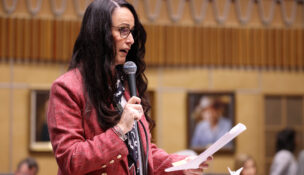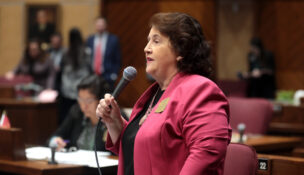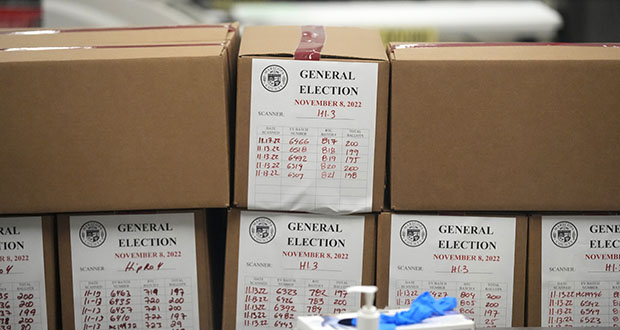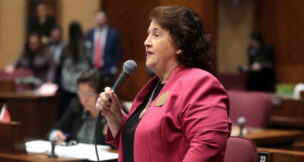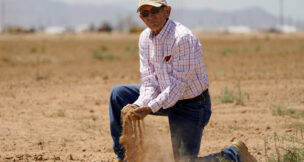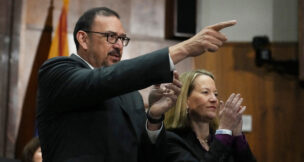Turning Point Action sets sights on SRP board elections in 2026
Reagan Priest Arizona Capitol Times//August 22, 2025//
Turning Point Action sets sights on SRP board elections in 2026
Reagan Priest Arizona Capitol Times//August 22, 2025//
Key Points:
-
Turning Point Action targets low-key utility board election for 2026
-
Group aims to prevent clean energy candidates from gaining more seats
-
SRP’s election process is complicated, with only land-owning customers eligible
An often overlooked utility board election will get the Turning Point treatment in 2026 with the conservative group now seeking to prevent clean energy candidates from gaining more seats.
Elections for the Salt River Project’s two boards and two councils are usually quiet affairs. They happen in the spring before larger, headline-grabbing races at the state and national level, and typically go unnoticed by national political organizations.
Now, however, Turning Point is pouring money and staffing into registering voters for the elections.
“My goal is to out register the Democrats 10-1 for the (SRP) Election,” Turning Point Chief Operating Officer Tyler Bowyer wrote in a post on X. “We need to get the radical environmentalists out of AZ and prevent them from dramatically increasing our Utility rates.”
Turning Point leaders did not respond to multiple requests for comment or interviews, but on social media they echoed Bowyer’s sentiments, saying the goal is to rid the SRP board of “Green New Deal extremists” and bring back “freedom-minded leadership.”
“The Green New Deal means higher bills, fewer choices, and energy policies written by people who’ve never seen a utility bill,” Turning Point’s “Support Responsible Policies” account posted on X. “We need affordable, reliable power — not activists and extremists.”
Election day for SRP isn’t until April 7 and candidates won’t be able to file nomination papers until January, but Turning Point has been sending canvassers out to register voters since at least June. The effort is concerning for environmental activists who don’t want to see more money influencing utility elections, but could benefit Turning Point as it sets its sights on races for other seats like governor, secretary of state and attorney general.
Chuck Coughlin, CEO of HighGround Public Affairs and a former Republican campaign consultant, said he sees Turning Point’s SRP canvassing strategy as “fairly effective” for increasing voter turnout in other races.
“This certainly becomes a significant issue inside SRP service territory, which is over a million people,” Coughlin said. “It’s all that East Valley side of the equation which they are fairly strong in and which, politically, is reflective of that more conservative base.”
SRP is a nonprofit subdivision of the state that provides water and power to more than 2 million people in and around the Valley. It is regulated by two organizations, the Salt River Valley Water Users’ Association and the Salt River Project Agricultural Improvement and Power District.
Both the association and the district have a board and a council. The boards work with SRP’s management on business affairs issues, while the councils create bylaws for the boards and serve as a liaison for landowners.
SRP elections are complicated, given that only land-owning SRP customers are eligible to vote, not all customers receive both water and power from SRP, and its service area sporadically touches almost every area of the Valley, from Peoria and Goodyear to Mesa and Scottsdale.
In recent years, candidates who support clean energy initiatives have won more and more seats on SRP’s boards and councils. A total of 14 candidates ran on a clean energy slate in 2024, four of whom won seats on the boards and councils.
Political action committees that focus on climate change and the environment are known to fund candidates for SRP elections. In previous years, clean energy candidates have received donations from Chispa Arizona and the Jane Fonda Climate PAC.
Despite this, Sandy Bahr, executive director of the Sierra Club’s Grand Canyon chapter, said most environmentalists and clean energy advocates wouldn’t consider the current makeup of SRP’s boards to be overwhelmingly friendly to liberal energy policies.
“It’s quite the opposite,” Bahr said. “Turning Point seems to think they need a board that will just rubber stamp whatever management brings to the board. That’s what they used to have, and now there are a few members who ask questions, but there’s not a majority to say no.”
And Turning Point isn’t the only Republican-aligned group looking to get into the SRP elections. Arizonans for Responsible Growth, a new PAC started by construction executive Jimmy Lindblom, is already building a slate of candidates.
Lindblom’s group, comprising business leaders, focuses on supporting utility companies to boost Arizona’s economic growth.
“You can allow the community to shape you, or you can help shape the community, and this group that we’ve formed really wants to be a part of shaping the community and helping come up with new ways to help support the utilities,” Lindblom said.
Arizonans for Responsible Growth already has around $32,000 in cash on hand to support potential SRP candidates, according to its most recent campaign finance report.
It is currently unclear how much money Turning Point is devoting to its canvassing efforts as the group has not filed any 2025 campaign finance reports with the Maricopa County Recorder’s Office, which handles SRP races. But Turning Point is known for pouring hundreds of thousands — if not millions — of dollars into races it sets its sights on.
Bahr said SRP’s elections are already influenced by the fact that many of its members have longstanding familial ties to the creation of the boards and councils that help keep them in their positions. She said she is worried about the effect of adding more money from outside groups.
“It’s concerning always how much money influences elections, but it’s particularly concerning in an election like this that is already so wired to maintain the status quo, that is already so hard for people to break through,” Bahr said.
Some SRP candidates have spent big in the past few years, doling out anywhere between $25,000 and $70,000 during one three-month election cycle. But others, mainly incumbents whose families have a history on the board, haven’t even created campaign committees to raise money.
For next year’s elections, SRP is holding candidate calls on Oct. 1 and Oct. 8, with a candidate forum on Oct. 10. Potential candidates will have to file nomination papers and petition signatures between Jan. 7 and Feb. 6 to appear on the ballot.
Correction: The headline has been updated to reflect the correct name of Turning Point Action.







